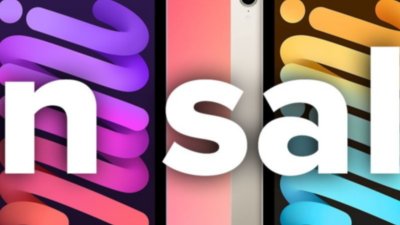Apple last week stopped accepting cash for iPhone purchases and reinstated a two-per-person sales limit in an effort to curb the black market for unlocked versions of the touch-screen handset.
"Customer response to the iPhone has been off the charts, and limiting iPhone sales to two per customer helps us ensure that there are enough iPhones for people who are shopping for themselves or buying a gift," Kerris said. "We're requiring a credit or debit card for payment to discourage unauthorized resellers."
Since introducing iPhone on June 29th, Apple has sold over 1.4 million of the handsets, the company announced as part of its fiscal fourth quarter earnings last week. However, it estimated that approximately 250,000 of those iPhones were sold to buyers who intended to unlock them and then resell them for use on wireless networks other than AT&T.
The new sales restrictions are the latest moves by Apple in its game of cat and mouse with iPhone hackers. Last month, it released iPhone software update 1.1.1, which rendered unlocked iPhones effectively useless.
 Katie Marsal
Katie Marsal



-xl-m.jpg)



 Christine McKee
Christine McKee
 Chip Loder
Chip Loder
 Thomas Sibilly
Thomas Sibilly
 Wesley Hilliard
Wesley Hilliard

 Amber Neely
Amber Neely
 William Gallagher
William Gallagher
 Malcolm Owen
Malcolm Owen








64 Comments
This is kind of bull shit. What do they care how people want to pay? What if I don't believe in Credit Cards I can't get a phone?
The truth is they hate receiving cash period. Apple Retail Employees are forced to use those stupid hand held cash machines because it gets Apple two things, your credit card number and your email address. I'm sure this new CC only for iPhones is just the beginning. Soon Apple Retail will be CC only.
People have been getting bent out of shape and hyperventilating about this on places like cnet.com and engadget.com all weekend long.
All I can figure is that there are lots of resellers in those audiences.
Call me a fanboy, but despite the fact that it might inconvenience an occasional person who wanted to buy it just by himself/herself for a large family, I am with Apple on this one. With 15% to 20% of all sales being unlocked phones, creating a significant mass of user experience that is misaligned with what Apple intended could lead a lot of potential problems for Apple -- e.g., these same types will be caterwauling about broken software and hardware because of Apple's inability or unwillingness to fix it. In addition, use along those lines stiffs a partner -- albeit one that is not terribly sympathetic figure -- with whom Apple had entered into a good faith agreement. Finally, nothing would be worse that for Apple to introduce this in the UK, Germany, and France, and not have enough to meet demand. There will be a lot of p-o'ed customers that will have migrated to other smartphones.
I am amazed that people can't wait a few months. (On the other hand, as a shareholder, I must admit to being thrilled at what this presages re. demand for the product!).
It's business tactics like this that draw me further and further away from Apple. I'm in between Macs, sold my iBook and haven't bought a replacement yet, but the more 'news' Apple makes the less I like them as a company. I'm sure there are two sides to this but I don't think there is a shortage of iPhones for sale, so what gives?
It's business tactics like this that draw me further and further away from Apple. I'm in between Macs, sold my iBook and haven't bought a replacement yet, but the more 'news' Apple makes the less I like them as a company. I'm sure there are two sides to this but I don't think there is a shortage of iPhones for sale, so what gives?
What gives is that they're making some effort to keep on good terms with AT&T. Eventually, Apple will gain enough power in this market to shun its partners, but for now, without AT&T, there is no future for the iPhone. People keep forgetting that.
How much of an impact on this tactic will have on the unlocking business is debatable. I doubt it will stop many at all. But it will placate AT&T for now.
Apple just wants control over the platform.
Better in the long run, methinks...
addition to post:
- after having unlocked a bunch of U.S. phones for EU use.
- stw